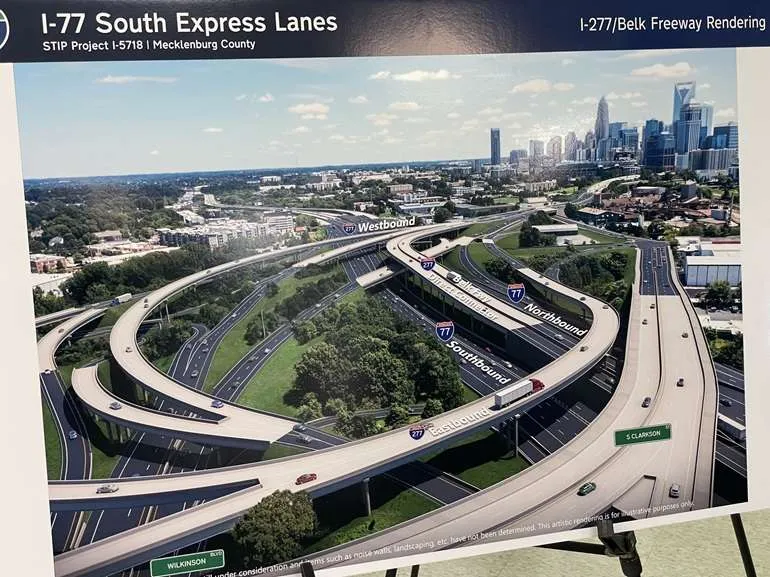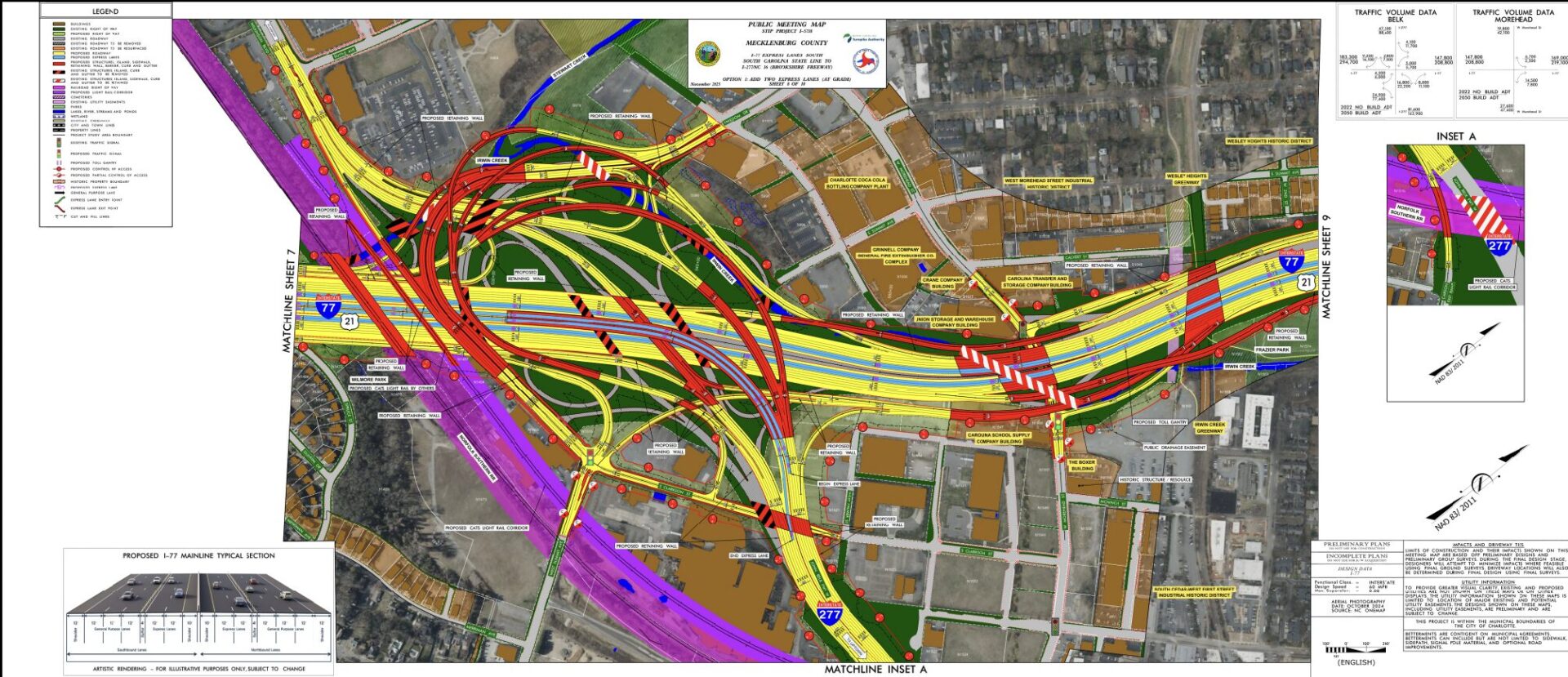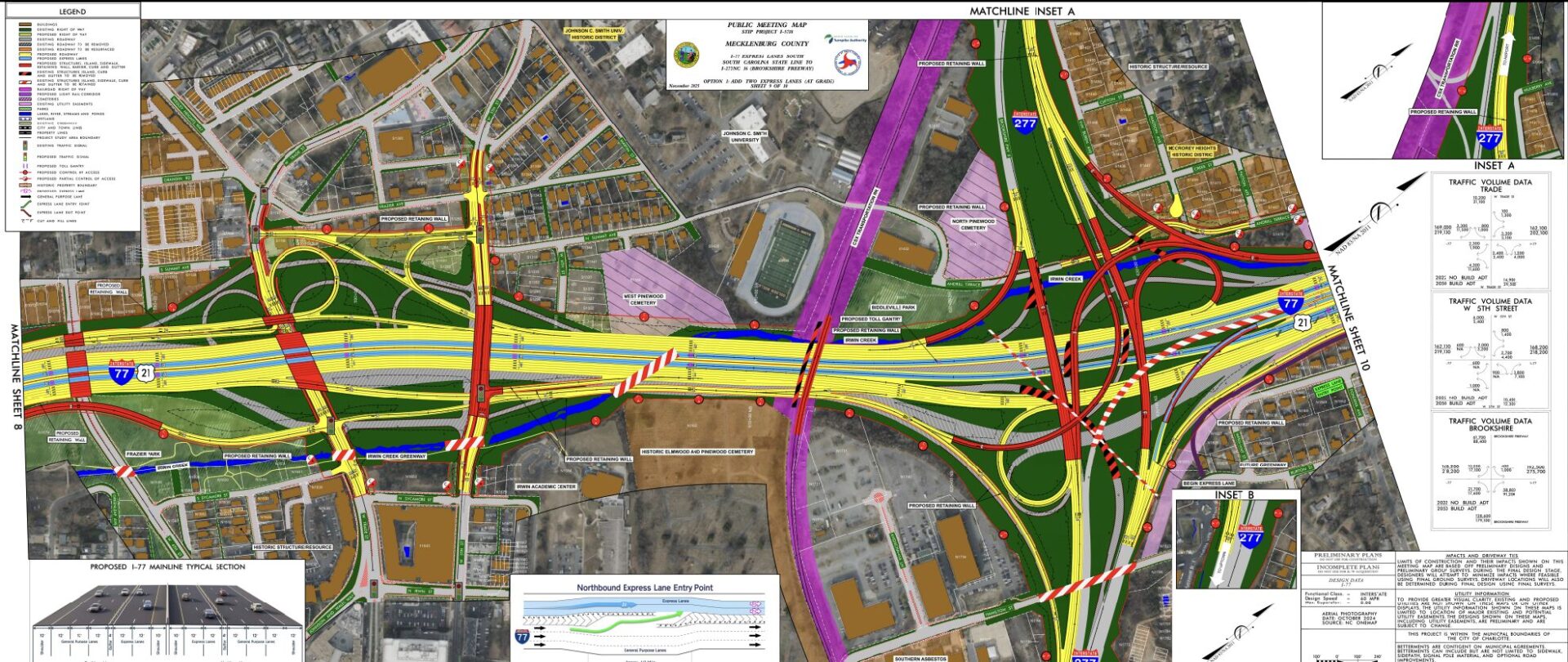Why Expanding I-77 South with New Toll Lanes Is the Wrong Path for Charlotte

Renderings of the proposed I-77 toll lane designs include this graphic depicting the I-77/I-277 interchange. (Photo by Ryan Pitkin)
For more than 60 years, Interstate 77 has been a physical and social barrier in the heart of Charlotte — a highway that slices through thriving neighborhoods, displacing hundreds of families and businesses, and cutting communities off from each other. Its construction caused profound and lasting harm to many of Charlotte’s Black neighborhoods, severing people from schools, parks, jobs, and opportunity.
Now, the North Carolina Department of Transportation (NCDOT) is proposing to add four more toll lanes to I-77 South between I-277 and I-485. If built, this project would widen the highway’s footprint even further, deepen the divide, and make it harder — not easier — for our city to grow sustainably and equitably.
See the harm for yourself

NCDOT’s proposed widening of I-77 into Fourth Ward, Frazier Park, and Wesley Heights.
NCDOT recently released new concept maps showing exactly what this wider highway would look like — including the homes, parks, cemetery land, and businesses that would be taken through eminent domain to make room for it. The public can review these maps and learn more about the proposal on NCDOT’s project page:
👉 Maps of I-77 with Four Toll Lanes
These visuals make something unmistakably clear: the human and community costs of this widening are enormous.
Charlotte deserves better.
Highway widening doesn’t solve congestion — not here, not anywhere
Decades of evidence from across the country show that adding lanes only brings short-term relief before congestion returns. This phenomenon, known as “induced demand,” is well-documented: widening highways encourages more people to drive more frequently.
Cities that have repeatedly expanded their highways — such as Houston, Atlanta, and Los Angeles — remain among the most congested regions in the nation. Charlotte doesn’t need to repeat their mistakes.
If our goal is to reduce travel times, increase access to opportunity, and improve quality of life, doubling down on a 20th-century strategy won’t get us there.
A different vision is possible — one that repairs, reconnects, and restores
Instead of further widening I-77, Charlotte has the chance to heal what was broken. Around the country, cities are choosing restoration over expansion — and the results show what’s possible when communities decide to repair past harm. Here are just a few:
Dallas – Klyde Warren Park: A freeway trench was capped with a 5.2-acre public park that reconnected uptown neighborhoods and catalyzed billions in economic development.
Rochester, NY – Inner Loop Removal: The city filled a sunken expressway that cut through downtown, restoring the street grid and creating space for new housing, businesses, and public spaces.
Atlanta – The Stitch (in planning): A proposed three-quarter-mile cap over the Downtown Connector would reconnect neighborhoods and create 14 acres of parks, plazas, and green spaces.
Seattle – Freeway Park: One of the earliest freeway caps in the nation, designed to reconnect the city’s urban core divided by I-5.
Seattle – Waterfront Park: The city buried 1.7 miles of an elevated expressway and replaced it with a park that won the 2025 Outstanding New Park Project Award from World Urban Parks.
St. Paul, MN – Restore Rondo: Residents in St. Paul are working to revitalize the Rondo community with a land bridge that reconnects Rondo and reignites a vibrant African American cultural enterprise district that was destroyed by I-94.
Boston – The Big Dig: Perhaps the strongest national model for what’s possible. Boston buried a major highway that once cut through the heart of the city and replaced it with parks, plazas, housing, and people-centered streets.
These projects demonstrate how cities can choose to prioritize residents, businesses, and vibrant public spaces over increasing the number of cars and trucks through their urban core.
These projects also share a common thread: when communities demand change, leaders act.
Reconnecting neighborhoods is an investment in Charlotte’s future
Covering or burying sections of I-77, restoring crossings, rebuilding walkable street grids, and adding green spaces would provide people with safer and more direct access to jobs, education, and opportunities. It would create room for new homes and businesses. It would stitch communities back together after decades of division.
This is what a growing, future-ready, people-centered Charlotte looks like.
A highway widening project does the opposite — it deepens the divide and locks us into the sprawl and traffic patterns that make life harder for everyone.

NCDOT’s proposed widening into historic Pinewood Cemetery, Biddleville, and McCrorey Heights.
Local leaders need to hear from the community — now
NCDOT’s proposed toll-lane expansion is moving quickly, and it’s essential for Charlotte residents to speak up. Both the Charlotte City Council and the Charlotte Regional Transportation Planning Organization (CRTPO) — the region’s federally designated transportation decision-making body — will play major roles in what happens next.
They need to hear clearly:
Charlotte should not repeat the mistakes of the past.
Charlotte should repair, reconnect, and restore — not widen.
What you can do right now
1. Email City Council and CRTPO Board Members
Tell them you oppose adding toll lanes to I-77 South and instead support reconnecting neighborhoods separated by the highway and capping or burying sections of it, as many cities have done successfully.
Charlotte City Council — Copy + Paste Emails
[email protected]
[email protected]
[email protected]
[email protected]
[email protected]
[email protected]
[email protected]
[email protected]
[email protected]
[email protected]
[email protected]
[email protected]
Charlotte Regional Transportation Planning Organization (CRTPO) Board — Copy + Paste Emails
[email protected]
[email protected]
[email protected]
[email protected]
[email protected]
[email protected]
[email protected]
[email protected]
[email protected]
[email protected]
[email protected]
[email protected]
[email protected]
[email protected]
[email protected]
[email protected]
[email protected]
[email protected]
[email protected]
[email protected]
[email protected]
[email protected]
[email protected]
[email protected]
[email protected]
[email protected]
[email protected]
[email protected]
[email protected]
2. Join the movement to reconnect Charlotte
We’ve formed a growing coalition of neighborhood organizations, nonprofits, and local businesses that believe Charlotte deserves better than another massive highway widening.
If you’re part of an organization that would like to join this coalition, simply reply to this email and let us know.
To stay informed about meetings, public comment opportunities, and ways to take action:
Thanks for reading!
As a nonprofit, community support is crucial for us to continue our work — including providing free articles like this. If you found this article helpful, please consider supporting Sustain Charlotte.
Want to stay in the loop? Subscribe to our free weekly newsletter and follow us on Instagram and Facebook.
